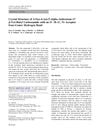6 citations,
April 2005 in “Journal of dermatological science” The study found nine new hair protein genes in human hair follicles.
[object Object]  6 citations,
August 1996 in “The Journal of Clinical Endocrinology and Metabolism”
6 citations,
August 1996 in “The Journal of Clinical Endocrinology and Metabolism” MK-386 and finasteride together effectively reduce DHT levels, potentially treating acne and male pattern baldness.
 5 citations,
June 2023 in “BMC genomics”
5 citations,
June 2023 in “BMC genomics” A specific gene mutation causes long hair in Angora rabbits.
![Synthesis and In Vitro Study of 17β-[N-Ureylene-N,N′-Disubstituted]-4-Methyl-4-Aza-5α-Androstan-3-Ones as Selective Inhibitors of Type I 5α-Reductase](/images/research/d19df8a7-8de6-4430-8a0d-4ffa1f502985/small/15608.jpg) 5 citations,
February 1997 in “Bioorganic & Medicinal Chemistry”
5 citations,
February 1997 in “Bioorganic & Medicinal Chemistry” New compounds were made that effectively block a specific enzyme related to androgen conditions.
4 citations,
March 2021 in “Experimental dermatology” Minoxidil increases nail growth more than biotin.
 4 citations,
July 2020 in “Journal of Dermatological Treatment”
4 citations,
July 2020 in “Journal of Dermatological Treatment” Minoxidil injections can speed up hair regrowth in non-severe patchy hair loss, but combining it with steroids doesn't improve results.
4 citations,
December 2015 in “MVP journal of medical science” Topical Minoxidil 5% works as well as the combination treatment for hair loss.
 4 citations,
July 2015 in “Veterinary Dermatology”
4 citations,
July 2015 in “Veterinary Dermatology” Two types of 5α-reductase are in dog skin, which might make dutasteride better than finasteride for treating dog hair loss.
 4 citations,
August 2010 in “Acta Biologica Hungarica”
4 citations,
August 2010 in “Acta Biologica Hungarica” New steroidal compounds moderately block an enzyme related to testosterone conversion, less effectively than finasteride.
 4 citations,
January 1998 in “Heterocycles”
4 citations,
January 1998 in “Heterocycles” Researchers made two new compounds that could be used for medicine.
3 citations,
June 2017 in “Reproductive biomedicine online” A certain mutation in the fetal alpha 5-reductase gene is linked to a higher risk of late miscarriage.
3 citations,
May 2017 in “Bioorganic & medicinal chemistry letters” New compounds were made that are promising for prostate cancer therapy.
[object Object]  3 citations,
March 2016 in “Medicinal Chemistry Research”
3 citations,
March 2016 in “Medicinal Chemistry Research” Scientists found out the structure of a human enzyme linked to prostate cancer and hair loss, which could help in designing drugs.
 3 citations,
February 2013 in “PubMed”
3 citations,
February 2013 in “PubMed” 5α-reductase inhibitors like finasteride and dutasteride can help treat skin disorders stimulated by androgens, such as hair loss and acne.
 3 citations,
January 2001 in “Cambridge University Press eBooks”
3 citations,
January 2001 in “Cambridge University Press eBooks” Finasteride effectively treats hair loss and enlarged prostate in men, with mild side effects.
 3 citations,
December 2000 in “International Journal of Cosmetic Science”
3 citations,
December 2000 in “International Journal of Cosmetic Science” The study created a new method to test drugs that affect hormone processing in skin.
 3 citations,
October 1995 in “International Journal of Dermatology”
3 citations,
October 1995 in “International Journal of Dermatology” Finasteride helps treat skin issues like acne and baldness by blocking testosterone conversion.
![The Synthesis of (−)-4-Methyl-8-Chloro-Trans-1,2,3,4,4a,5,6,10b-Octahydrobenzo-[f]-Quinolin-3-One-[3-14C] (LY300502-14C) via a Circuitous Route](/images/research/73bab8dc-bdf0-45e3-8ef7-73d0d4b93cb1/small/21074.jpg) 3 citations,
October 1994 in “Journal of Labelled Compounds and Radiopharmaceuticals”
3 citations,
October 1994 in “Journal of Labelled Compounds and Radiopharmaceuticals” Scientists made a carbon-14 labeled version of a drug with a 48% yield and over 99% purity.
2 citations,
July 2022 in “Frontiers in Medicine” Combining minoxidil with microneedling or spironolactone is more effective for female hair loss than using minoxidil alone.
2 citations,
June 2022 in “Cells” 3D cell cultures are better for testing hair growth treatments than 2D cultures.
 2 citations,
June 2021 in “Research Square (Research Square)”
2 citations,
June 2021 in “Research Square (Research Square)” A new gene mutation causes long hair in some Maine Coon cats.
 2 citations,
December 2017 in “Journal of The American Academy of Dermatology”
2 citations,
December 2017 in “Journal of The American Academy of Dermatology” The article suggests that five common skin-related lab tests may be unnecessary and could cause extra cost and anxiety without improving patient care.
 2 citations,
January 2010 in “Hormone Molecular Biology and Clinical Investigation”
2 citations,
January 2010 in “Hormone Molecular Biology and Clinical Investigation” Low dose finasteride decreases certain steroids, possibly increasing depression risk.
2 citations,
March 2009 in “Journal of Clinical Dermatology”  2 citations,
December 2008 in “Journal of Chemical Crystallography”
2 citations,
December 2008 in “Journal of Chemical Crystallography” The research shows that hydrogen bonds greatly affect the crystal structure of a Finasteride derivative.
 1 citations,
July 2023 in “Cureus”
1 citations,
July 2023 in “Cureus” Cetosomal minoxidil alone and with finasteride is effective and well-tolerated for hair loss treatment.
 1 citations,
April 2023 in “Langmuir”
1 citations,
April 2023 in “Langmuir” Damaged hair allows water to penetrate more easily, and fatty acids from shampoos can deposit on hair surfaces.
1 citations,
August 2022 in “Journal of Cosmetic Dermatology” Using both 5% spironolactone and 5% minoxidil together is safe and more effective for treating hair loss.
 1 citations,
December 2021 in “Androgens”
1 citations,
December 2021 in “Androgens” Testosterone and its metabolites affect brain functions and could help treat neurological disorders.
1 citations,
October 2018 in “Ukraïnsʹkij žurnal dermatologìï, venerologìï, kosmetologìï” Wolvit® (biotin 5 mg) is effective and safe for treating hair loss and scalp conditions in women.


![Synthesis and In Vitro Study of 17β-[N-Ureylene-N,N′-Disubstituted]-4-Methyl-4-Aza-5α-Androstan-3-Ones as Selective Inhibitors of Type I 5α-Reductase](/images/research/d19df8a7-8de6-4430-8a0d-4ffa1f502985/small/15608.jpg)









![The Synthesis of (−)-4-Methyl-8-Chloro-Trans-1,2,3,4,4a,5,6,10b-Octahydrobenzo-[f]-Quinolin-3-One-[3-14C] (LY300502-14C) via a Circuitous Route](/images/research/73bab8dc-bdf0-45e3-8ef7-73d0d4b93cb1/small/21074.jpg)






